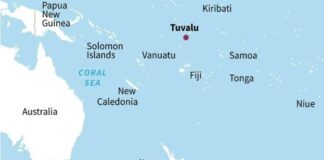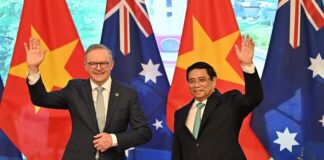THE RUDD government’s first budget is a mixture of small mercies and big crimes. There is a $10 tax cut for low-waged workers, an increase in the child-care rebate and a $750 education rebate for parents.
There’s a modest amount of money for hospitals ($1 billion)-almost exactly what the government will save as many workers stop collecting the health insurance rebate by opting-out of the private system.
The Liberals expressed outrage at the budget. But the fact that they were the only ones to agree with health insurance corporations’ complaining about changes to the Medicare surcharge tells us where their interests really lie.
Labor’s response was to argue that the budget represents the right balance between relieving pressure on “working families” and fighting inflation.
But this is a false debate. Firstly the help for working class people is very small indeed. The budget provides no extra help for the half a million Australians out of work, and living in worsening poverty as unemployment benefits lose their purchasing power-despite a record $21 billion surplus.
Alongside this, Labor has abandoned any idea of providing good quality essential services. Instead it has embraced John Howard’s belief that people should be pressured to buy education, health care, child care and transport from profit-seeking corporations. In return, the government is handing out tens of billions in tax rebates to make the prices of these services more affordable. This money is going to bolster the profits of the private hospitals, the private schools, the private health insurance companies, the car companies, the toll-road companies, the oil companies, etc.
However, to access these rebates, you have to have a job and a sufficient income. There is no rebate or subsidy for unemployed people, pensioners who don’t pay tax or the working poor who can’t find the money upfront to pay for these services.
Meanwhile public schools, hospitals and transport are starved of the money they need because Labor accepts the neoliberal ideology that government must minimise involvement in service delivery.
Inflated ideology
Labor’s second argument-that this budget will fight inflation-is ideologically-driven nonsense. It is untrue that fiscal restraint will “protect” Australia from global financial instability. Deep in the budget papers is the admission that much of Australia’s inflation reflects rising prices in the rest of the world. In the rich countries, prices are rising at 3 per cent and in developing countries like China, it’s 6 per cent on average. These rises are likely to keep filtering through the resources boom as Australia continues to export to Asia.
Secondly, if economic conditions continue to deteriorate, Labor’s approach of under-funding services and public sector cutbacks could be disastrous for working class people. Already, there are some very nasty cuts to the public sector thanks to the razor gang’s demand for another 2 per cent “efficiency dividend”.
Thousands of jobs are to go in front-line departments: 269 from the Department of Families, Housing and Community Services; 179 from Health and Ageing; 213 from Education, Employment and Workplace Relations; 445 from Human Services; 200 from Centrelink; 171 from Medicare; 221 from Immigration; 142 from Industry, Science and Research; 85 from the CSIRO; 166 from the Bureau of Statistics; and 1137 from the Tax Office.
But when you look at the winners, you get a glimpse of Labor’s real priorities: Customs gets 146 new positions; ASIO gets 186 (a 14 per cent increase) while the Human Rights Commission loses 15 jobs (a 14 per cent cut).
But it is the military that are the big winners: 1591 more people will be trained to kill. These priorities reflect the government’s real strategy for fighting inflation-to comply with the demands of big business to shift the burden from profits to wage-earners. Allowing the Reserve Bank to keep attacking living standards through higher interest rates is another crucial part of this strategy.
The irony of this is that by allowing the economy to slow, Labor expects unemployment to rise by half a percent in the coming year-that’s 60,000 people. For Rudd and Swan, that’s a positive benefit because wages “are not forecast to accelerate given the anticipated easing in labour market conditions”.
Nowhere is there talk of restraining the greed and price-gouging of the bosses: the budget shows that profits are up more than eight per cent this financial year, and are expected to rise nearly 19 per cent in 2008-9.
By Phil Griffiths





